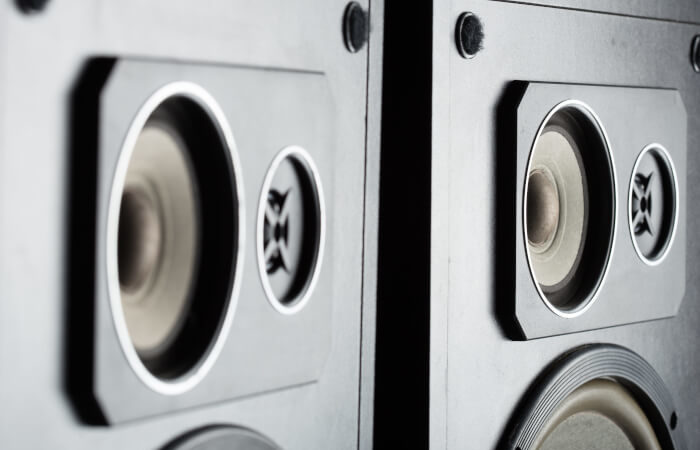Music Player Daemon (MPD) allows remote access for playing music (MP3, Ogg Vorbis, FLAC, AAC, Mod, and wave files) and managing playlists. MPD is designed for integrating a computer into a stereo system that provides control for music playback over a local network.
It also makes a great desktop music player, especially if you are a console addict, like frontend options, or restart X often.
MPD is a daemon which provides a queue and control for your music. The daemon stores info about all available music, and this info can be easily searched and retrieved. Player control, info retrieval, and playlist management can all be managed remotely. MPD uses a text file as a database in which to maintain the basic music file information when it is not running. Once the daemon is started, the database is kept completely in-memory and no hard disk access is necessary to look up or search for a song.
The goals are to be easy to install and use, to have minimal resource requirements (it has been reported to run fine on a Pentium 75), and to remain stable and flexible.
The separate client and server design allows users to choose a user interface that best suites their tastes independently of the underlying daemon (this package) which actually plays music. Recommended clients with a graphical interface include Ario, Gnome Music Player Client, and Sonata.
Features include:
- Plays MP3, Ogg Vorbis, FLAC, MP4/AAC, Mod, and wave files.
- Remotely control MPD over a network (IPv4 and IPv6 supported).
- Play MP3 and Ogg Vorbis streams.
- Easy to Install.
- Stores ID3 (id3v1 and id3v2) tag information (MP3s, FLAC’s, and AAC’s).
- Stores Vorbis Comments information (Ogg’s and FLAC’s).
- Stores MP4 metadata information (MP4/AAC’s).
- ID3/Vorbis information can be searched.
- Easy to import new songs.
- Buffer support for playback (prevents skipping due to high load or network latency).
- Gapless playback (great for live albums).
- Crossfading support.
- Seeking support.
- Save, Load, and Manage Playlists (in m3u format).
- Volume control (OSS, Alsa, and software mixers).
- Wide range of audio devices supported (OSS, Alsa, Sun, esd, arts, and more).
- Minimal hardware requirements.
Website: www.musicpd.org
Support: Forum
Developer: Warren Dukes, J. Alexander Treuman, Eric Wong, José Anarch, Guus Sliepen, Jim Ramsay, Qball Cow, Patrik Weiskircher
License: GNU General Public License v2.0
MPD is written in C++. Learn C++ with our recommended free books and free tutorials.
Return to Sound Systems | Return to Music Servers
| Popular series | |
|---|---|
| The largest compilation of the best free and open source software in the universe. Each article is supplied with a legendary ratings chart helping you to make informed decisions. | |
| Hundreds of in-depth reviews offering our unbiased and expert opinion on software. We offer helpful and impartial information. | |
| The Big List of Active Linux Distros is a large compilation of actively developed Linux distributions. | |
| Replace proprietary software with open source alternatives: Google, Microsoft, Apple, Adobe, IBM, Autodesk, Oracle, Atlassian, Corel, Cisco, Intuit, SAS, Progress, Salesforce, and Citrix | |
| Awesome Free Linux Games Tools showcases a series of tools that making gaming on Linux a more pleasurable experience. This is a new series. | |
| Machine Learning explores practical applications of machine learning and deep learning from a Linux perspective. We've written reviews of more than 40 self-hosted apps. All are free and open source. | |
| New to Linux? Read our Linux for Starters series. We start right at the basics and teach you everything you need to know to get started with Linux. | |
| Alternatives to popular CLI tools showcases essential tools that are modern replacements for core Linux utilities. | |
| Essential Linux system tools focuses on small, indispensable utilities, useful for system administrators as well as regular users. | |
| Linux utilities to maximise your productivity. Small, indispensable tools, useful for anyone running a Linux machine. | |
| Surveys popular streaming services from a Linux perspective: Amazon Music Unlimited, Myuzi, Spotify, Deezer, Tidal. | |
| Saving Money with Linux looks at how you can reduce your energy bills running Linux. | |
| Home computers became commonplace in the 1980s. Emulate home computers including the Commodore 64, Amiga, Atari ST, ZX81, Amstrad CPC, and ZX Spectrum. | |
| Now and Then examines how promising open source software fared over the years. It can be a bumpy ride. | |
| Linux at Home looks at a range of home activities where Linux can play its part, making the most of our time at home, keeping active and engaged. | |
| Linux Candy reveals the lighter side of Linux. Have some fun and escape from the daily drudgery. | |
| Getting Started with Docker helps you master Docker, a set of platform as a service products that delivers software in packages called containers. | |
| Best Free Android Apps. We showcase free Android apps that are definitely worth downloading. There's a strict eligibility criteria for inclusion in this series. | |
| These best free books accelerate your learning of every programming language. Learn a new language today! | |
| These free tutorials offer the perfect tonic to our free programming books series. | |
| Linux Around The World showcases usergroups that are relevant to Linux enthusiasts. Great ways to meet up with fellow enthusiasts. | |
| Stars and Stripes is an occasional series looking at the impact of Linux in the USA. | |
